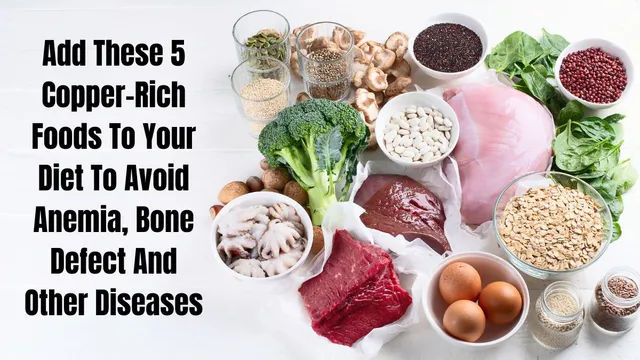- By Priyanka Munshi
- Thu, 27 Jun 2024 11:43 AM (IST)
- Source:JND
Red blood cell formation, which is essential for distributing oxygen throughout the body, depends on copper. Consuming foods high in copper can help you stay healthy because copper is a trace mineral necessary for many body processes. It also facilitates the utilization and absorption of iron, another vital mineral.
Copper also helps keep the immune system and nervous system healthy, preventing infections and preserving normal nerve function. Dark leafy greens like spinach and kale, organ meats like liver, seeds and nuts like sunflower seeds and almonds, and shellfish like oysters and crabs are foods high in copper. Other excellent sources of copper include whole grains and certain fruits like avocados and cocoa. Here is a list of some of the best foods high in copper that you should include in your diet to treat various illnesses and health problems, including anemia and bone abnormalities.

Consuming foods high in copper aids in iron absorption, immune system and nervous system health, and prevents infections.(Image Credit: Canva)
Nuts And Seeds
Rich in fiber, fats, and protein, almonds, cashew nuts, and sesame seeds are excellent sources of copper, according to USDA.
Dark Chocolate
Dark chocolate is rich in fiber, antioxidants, and minerals. It is high in calories but can help lower cholesterol and improve cardiovascular health.
Also Read: 5 Best Foods You Must Start Eating For Good Health As You Grow Old
Quinoa
Quinoa is an excellent replacement for rice, a whole grain that promotes health, and a high source of copper, according to USDA.

Common sources include dark leafy greens, liver, sunflower seeds, nuts, shellfish, whole grains, avocados, and cocoa.(Image Credit: Canva)
Potatoes
Did you know that potatoes with skin have the highest copper content? They are a good natural source of copper.
Organ Meat
Rich in copper, organ meats such as beef, calf, and chicken livers also include important elements like iron, folate, vitamin A, and vitamin B12, according to USDA.
(Disclaimer: This article is for informational purposes only. It is not a substitute for professional advice, diagnosis or treatment.)

